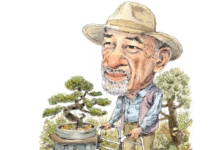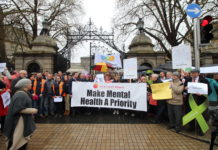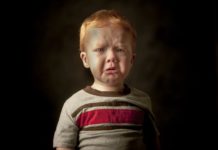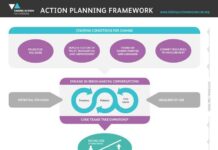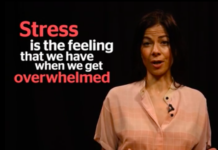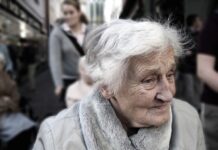Peer-Led Education Improves Recovery and Hopefulness
In a study of 428 outpatients in Tennessee, researchers from the University of Chicago and the NIMH found that BRIDGES, an 8-week peer-run education...
Free Your Mind! These Online Documentaries About Festivals Give Me Hope
For too long we have considered mental well-being to be about the five, ten, fifteen, or twenty percent of us that gets a psychiatric label each year. But really, if you look around at out world for a moment, you can easily see that to be alive, to be human, to exist, one must have support and healing. Festivals like this one give a glimpse of what the world can be like and I recommend this experience for envisioning a future mental health system or any futuristic vision of change.
How to Die
From The Atlantic: The existential psychotherapist Irvin Yalom, who has helped countless people grapple with their mortality and fear of death, is now coming to...
How to Integrate Culture into Mental Health Care
Researchers explore how culturally responsive services can create greater equity in mental health care.
Review Finds Link Between Recession and Mental Health Issues
A literature review published in BMC Public Health by researchers from Portugal and the Czech Republic summarizes results from 101 studies investigating the effect...
Don’t Reframe a Housing Crisis as a Mental Health Crisis
"It is unacceptable for this municipality to create a housing crisis and then reframe it as a mental health crisis," writes the Vancouver Area...
Could a Different Approach to “Mental Health” Be Part of Solving the Climate Crisis?
Earth Day 2013 is a good time to reflect on how problems in our mental health system reflect deep flaws in “normal” conceptions of what it means to be a human being. These flawed conceptions then contribute in a critical way to the climate crisis that threatens us all.
How Victimization Affects Political Engagement in Adolescence
Study examines relationships between experiences of victimization, beliefs in government, and political participation among 12th grade students
Researchers Challenge Popular Beliefs About Adolescent Risk Taking
Adolescent risk taking is explored contextually, beyond models of brain imbalances and adverse consequences.
Lack of Face-to-Face Contact Doubles Depression Risk for Older Adults
New research suggests that more frequent in-person contact lessens the risk of depression in older adults. The study, published in this month’s issue of the Journal of the American Geriatric Society, found that in Americans over fifty the more face-to-face contact they had with children, family and friends, the less likely they were to develop depressive symptoms.
Pro-LGBT Policies Reduce Teen Suicide
A study demonstrates a 7% reduction in suicide attempts for teens in states that had legalized same-sex marriage.
The Role of Intergenerational Trauma in the Perpetuation of Childhood Maltreatment
A new study examines the role parent borderline pathology plays in the perpetuation of childhood maltreatment.
Letters to the Editor: “The Treatment of Choice”
Readers respond to the New York Times article, “The Treatment of Choice,” about innovative programs for psychosis and schizophrenia that involve patients and their families in treatment decisions. “Narratives of success counter a drumbeat of faulty links of mental illness and violence, inaccuracies which serve only to further stigmatize and isolate individuals with psychiatric illness.”
Reducing Overuse of Low-Value Treatments
Researchers provide an action-planning framework to engage providers in the reduction of low-value healthcare.
How to Reach Out to Someone who is Struggling
In this piece for On Being, Omid Safi shares how an old Middle Eastern story about a drowning man can teach us how to offer...
Rethinking Madness: An Integral Vision
From Emerging Proud: Activists from around the world are gearing up for the launch of #EmergingProud, a grassroots social movement with the goal of de-stigmatizing...
Study Explores Māori Community’s Multifaceted Understanding of “Psychosis”
A new study explores how “psychosis” and “schizophrenia” are viewed within the Māori community in New Zealand.
Med Free Or Working On It
A website for "survivors of medical abuse, through psychiatric drugs and other medications, and are looking for healthy ways to support our minds and...
How Do We Prevent Loneliness?
Loneliness has been linked to negative health outcomes, but there are no interventions clearly proven to ‘fix’ the problem.
What Care for the Criminally Insane Can Teach Us
In this piece for The Pew Charitable Trusts, Michael Ollove reports on Oregon's model of intense care and supervision for those found guilty except for insanity.
"Oregon’s model...
Why U.K. Doctors Are Doling Out ‘Social Prescriptions’
From CBS Radio: U.K. doctors are increasingly prescribing social interventions — community based solutions such as art classes, gardening clubs, and walking groups — as an alternative...
Why Lifestyle Tips Won’t Cure the Mounting Stress People Face
From The Independent: Mental health awareness campaigns inundate us with lifestyle tips for managing stress such as mindfulness, meditation, exercise, and nutrition. But these tips...
New Medications Fail to Show Efficacy for Alzheimer’s Disease
Three phase III clinical trials assessing the efficacy of Lundbeck’s investigational drug idalopirdine for Alzheimer’s disease have failed
Why Some Children with Depressed Parents Show Resilience
Children of parents who suffer from depression have a severely heightened risk of mental health problems, but new research points to several factors that seem to strengthen young peoples’ resilience and predict good mental health.
Compassion and the Voice of the Tormentor
I'd like to share some personal thoughts on the nature of the Hearing Voices group method, and the insights that this kind of support generates. Through these groups, a tradition of mutual healing is being created that honors subjective experiences, and sharing our stories with each other in this way propels this exciting movement forward.


